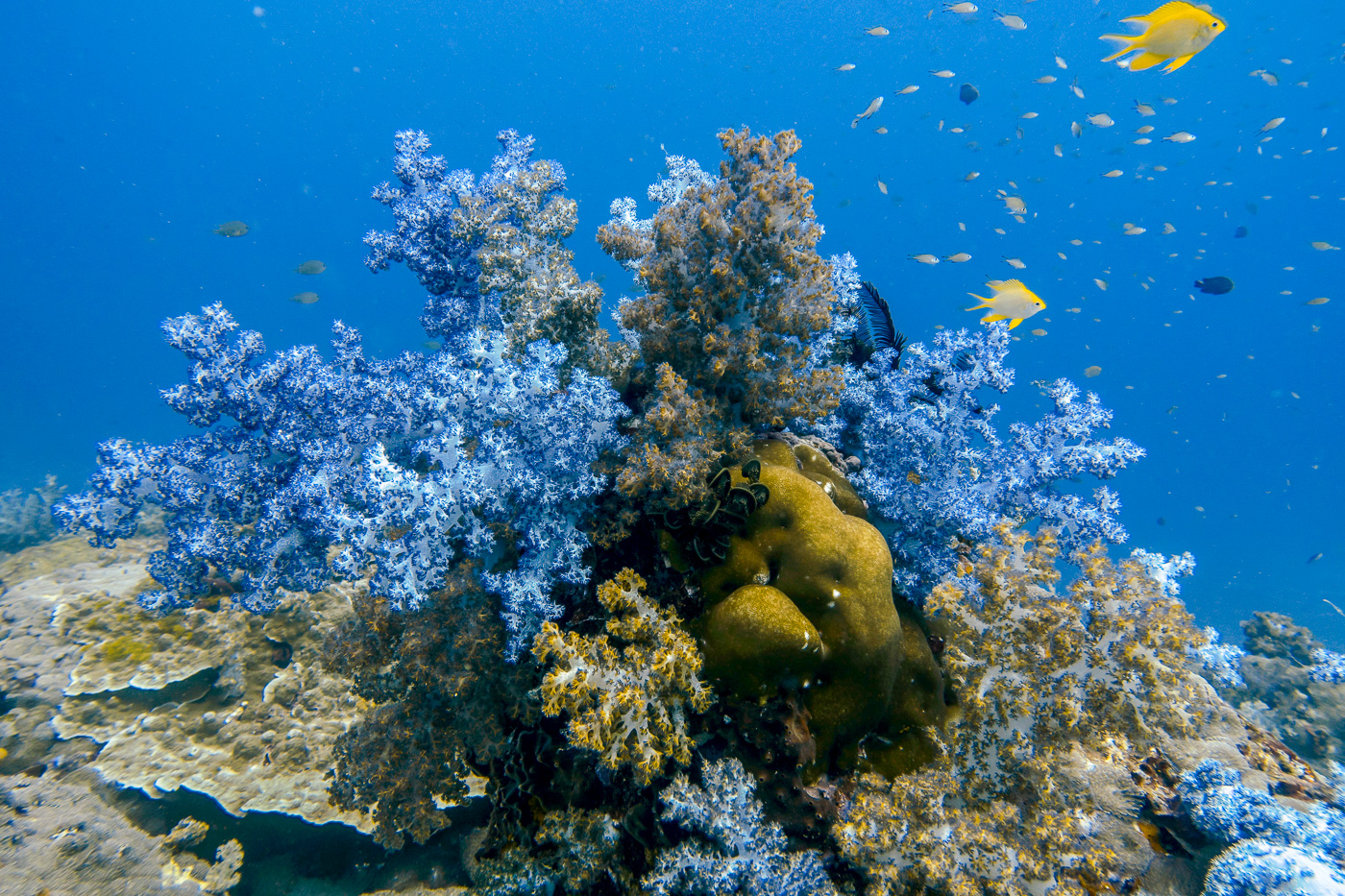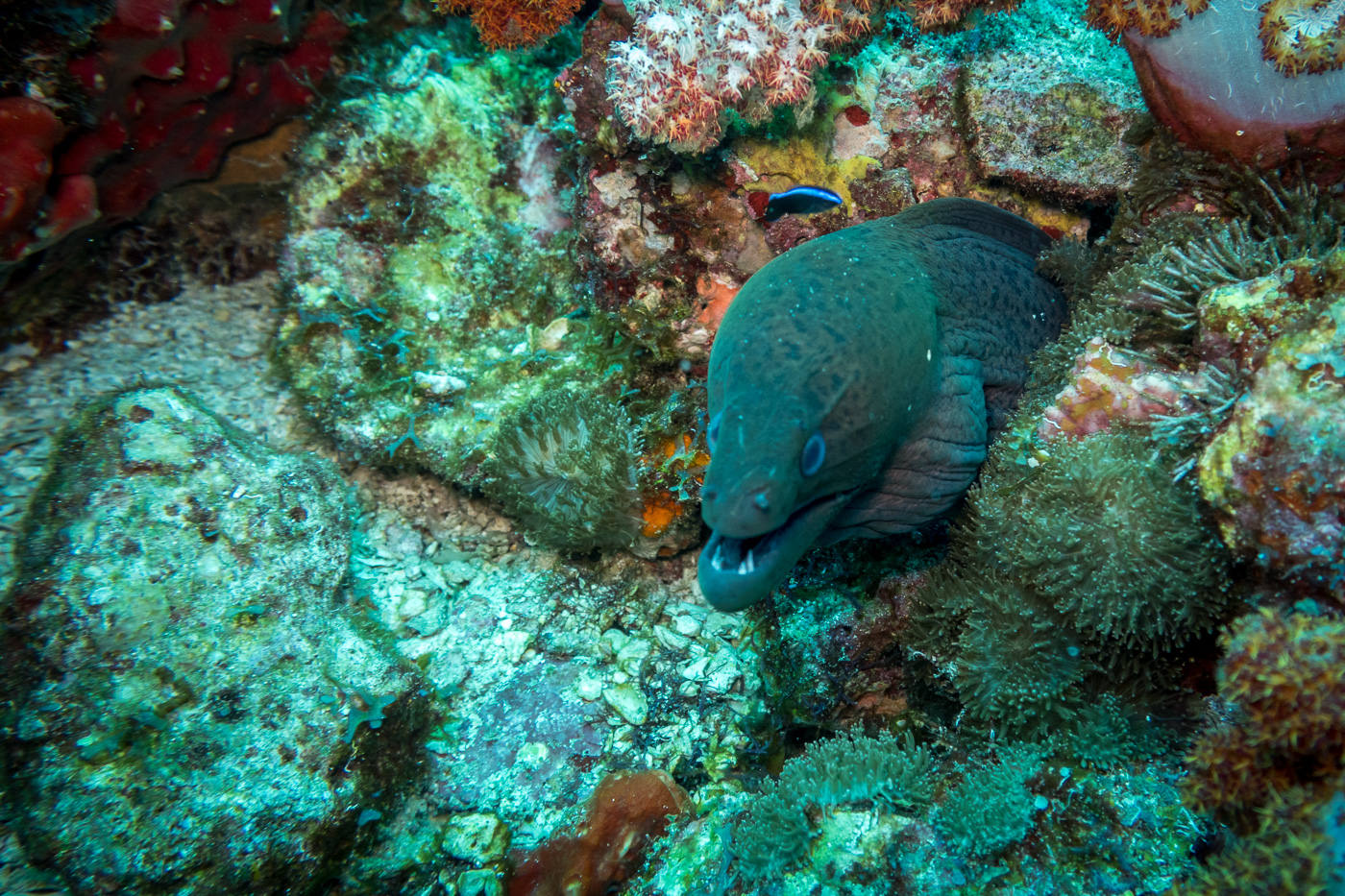As soon as we dropped down into the water we were faced with an explosion of color. Red and purple hued soft tree corals covered the rocky underwater outcropping. Schools of fish – fusiliers, red toothed triggers, glass fish and silver-sides – swam in every direction around us making it feel like were in some fantastical underwater snow globe rather than the middle of the Andaman sea. With no other refuge for kilometers, marine life flock to sister dive sites Hin Daeng and Hin Muang, two underwater pinnacles far off the coast of Koh Lanta, Thailand. On its good days, Hin Daeng and Hin Muang are the best diving in Thailand, boasting up to 45 meters of visibility and a good chance of swimming with whale sharks, manta rays and gray reef sharks. On its average days, these world-class dive sites offer dramatic wall drop-offs to explore, a variety of fish action and mesmerizing lush tropical coral gardens. This was our experience diving Hin Daeng and Hin Muang with Scubafish on our recent visit to Koh Lanta, Thailand.
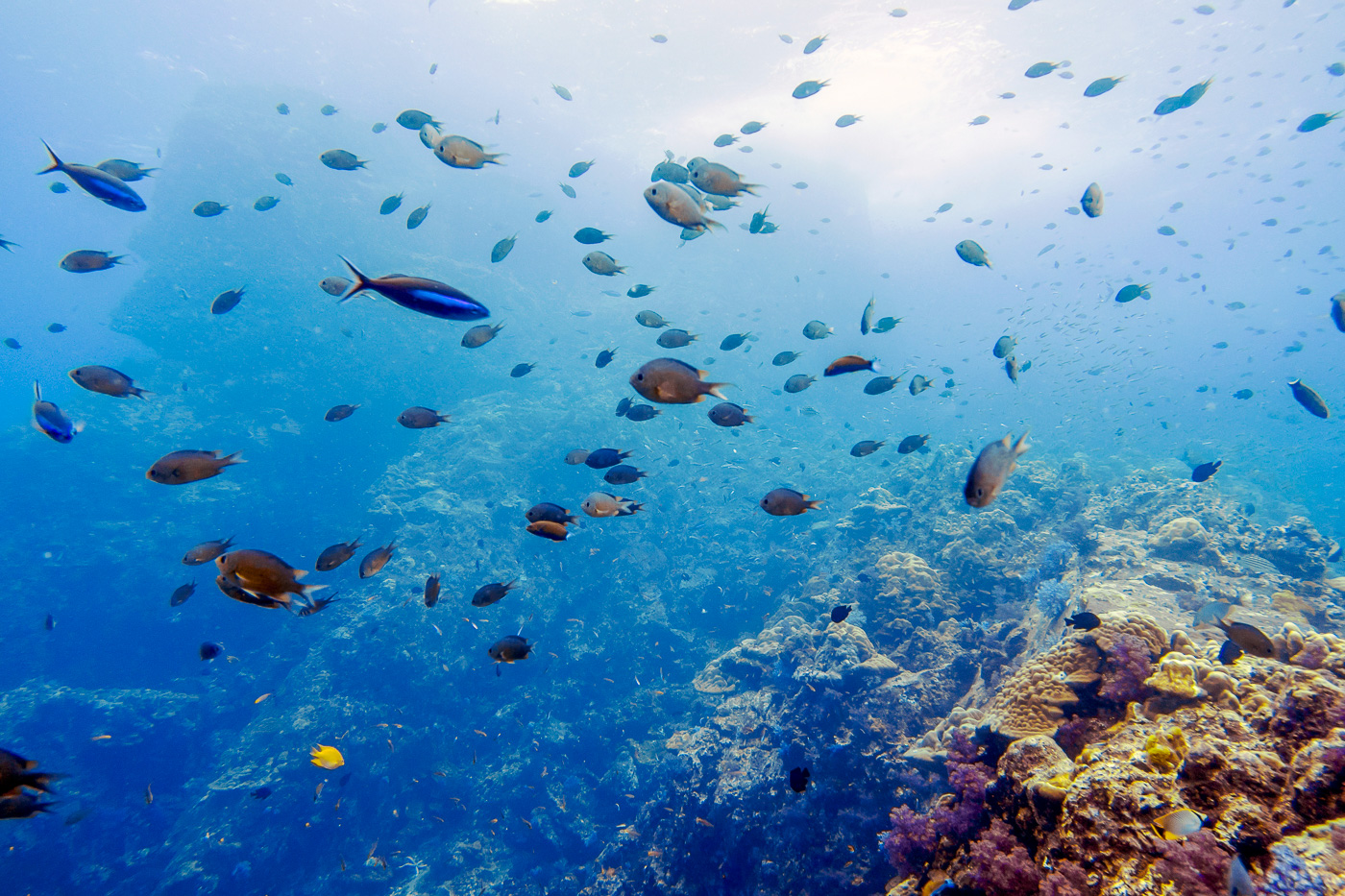 Andaman Sea Diving – Hin Daeng and Hin Muang
Andaman Sea Diving – Hin Daeng and Hin Muang
After two and a half hours of travel by boat from Koh Lanta, we arrived at the sites of Hin Daeng and Hin Muang. By now the sunny blue skies of Thailand’s coast had turned to more of a dull gray, making the waters from above look dark and ominous.
Hin Daeng is easily recognizable from the ocean’s surface with tops of the rocks sticking out of the waters. Our first dive, however, would be at Hin Muang located just a few hundred meters from Hin Daeng lying completely submerged. Our boat captain maneuvered us into position and sounded the alarm (the jolting blare of a loud horn) signaling the need for a quick jump to ensure we didn’t miss our dive start.
 Hin Muang (“Purple Rock”)
Hin Muang (“Purple Rock”)
Upon deflating our BCDs we could see Hin Muang lying beneath us. The visibility of the water that morning was excellent, at points up to 30 meters (100 feet). We quickly equalized our way down to 6 meters (20 feet) where Hin Muang started, swimming through dense schools of fish as we went.
It became clear immediately upon arriving at Hin Muang why the site was named “Purple Rock.” This rocky pinnacle is covered in a lush forest of purple-hued soft corals which looked like something straight out of a fairy tale.
We swam with our dive master Sanae (from our earlier Koh Haa dive) for the better part of an hour, reaching depths up to 30 meters, through a world of swaying corals and red toothed triggerfish. Every now and again we would hit a green monster (a cold water up-current distorting visibility), but otherwise water clarity was amazing. While our marine sightings were light during our Hin Muang dive (a swimming moray eel here, a shiny bluefin trevally there), the serene experience of exploring this blue and purple underwater paradise still sticks in my mind to this day.
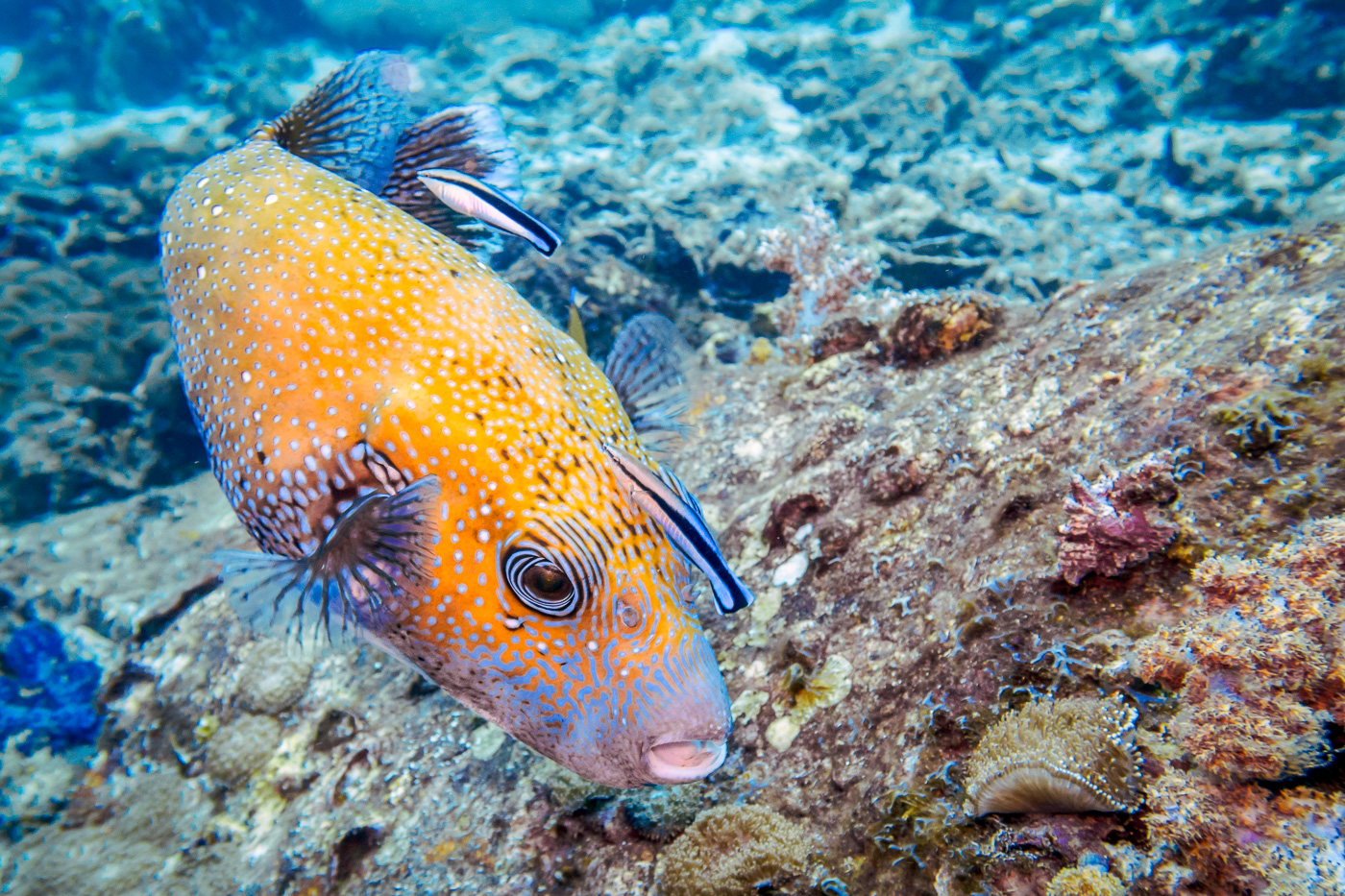
 Hin Daeng (“Red Rock”)
Hin Daeng (“Red Rock”)
After our surface interval for lunch aboard the Scubafish boat, we geared up for our second dive of the day at Hin Daeng. The Hin Daeng dive site is easy to find as it protrudes three meters above the ocean’s surface. Our descent started on the southern wall of Hin Daeng, which drops radically for an impressive 60 meters (200 feet). Advanced divers can go quite deep here although there isn’t much to see on the wall other than some nice corals and sea fans.
Unlike Hin Muang, the red soft tree corals that are the namesake of Hin Daeng (meaning red rock) were far less prominent than the purple corals at its sister site. In fact this rocky brown outcropping was mostly barren with smaller patches of soft coral, some green and red tree corals and some anemones. As with our Similan Island dives we were able to find a handful of giant and white-eyed moray eels lurking amongst the rocks.
Nonetheless the biodiversity of sea life at Hin Daeng was impressive and far different from what we had seen only an hour prior at Hin Muang. Moving around to the eastern side of the site, the gently sloping rocks of the ridge came alive with starry puffers, unicornfish, longnose filefish, false clown anemonefish, spotted boxfish, bird wrasse, moon wrase and bicolor parrotfish. The currents were certainly stronger along this ridge so we had to follow our guide Sanae’s lead carefully.
To end our dive, Sanae took us farther out into the great blue, where schools of fusilier and trevally gather. Here we waited patiently in the hopes of spotting a whale shark or manta ray. Both large pelagic fish visit Hin Daeng and Hin Muang as cleaning stations, especially between the months of February and April. Sadly it would not be our luck for a visit.
On a good day, Hin Daeng and Hin Muang are the best dive sites in Thailand as they offer challenging but stunning dives with the chance of seeing something large and special. Of course, as we have learned time and again like with our shark cage diving experience, good days in nature can’t be predicted. While we pulled away from Hin Daeng a little disappointed we didn’t spot mantas or whale sharks, we came back to Koh Lanta with plenty to talk about. And for us, that’s what makes diving worth it.
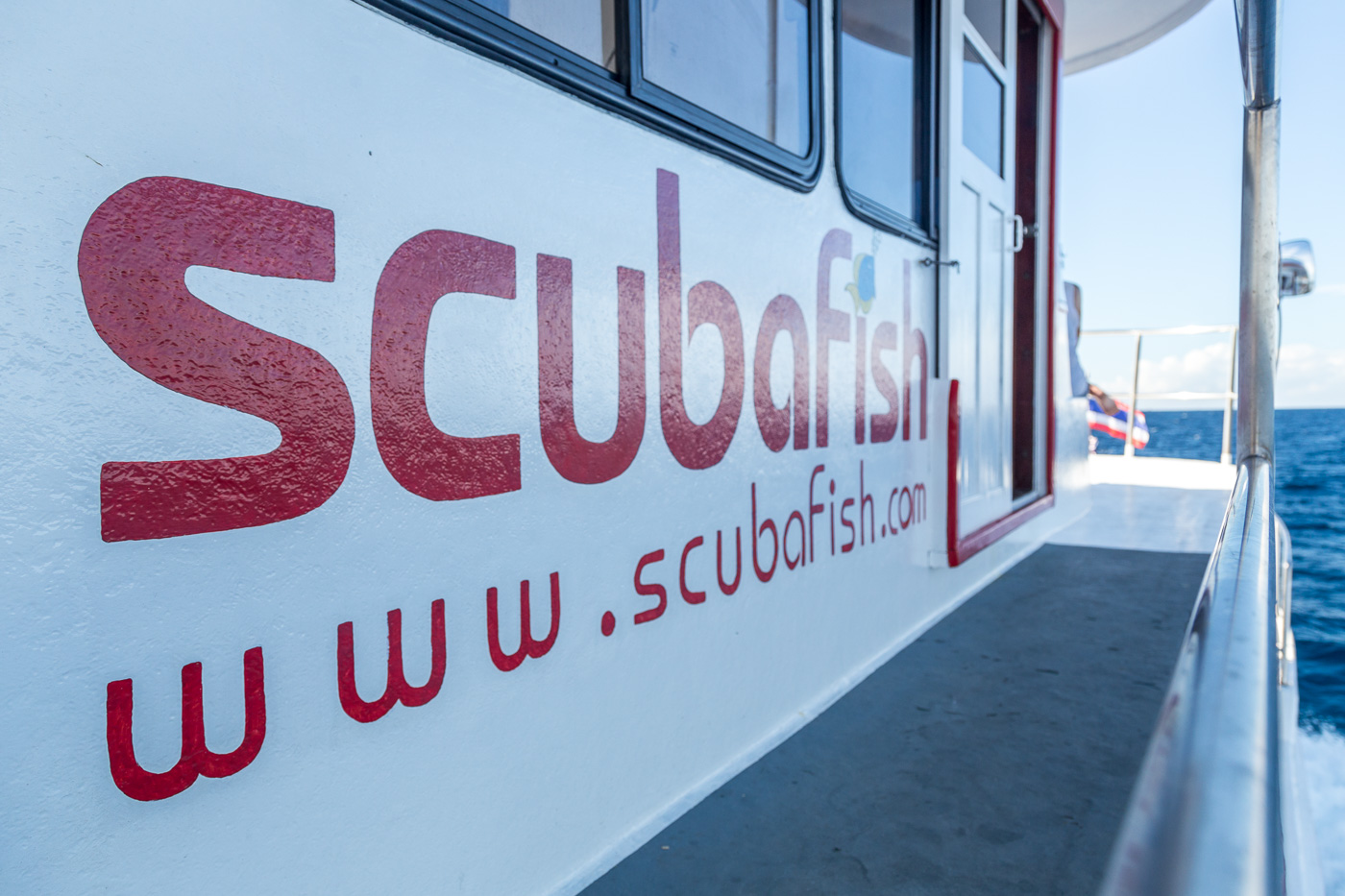 Diving Koh Lanta with Scubafish
Diving Koh Lanta with Scubafish
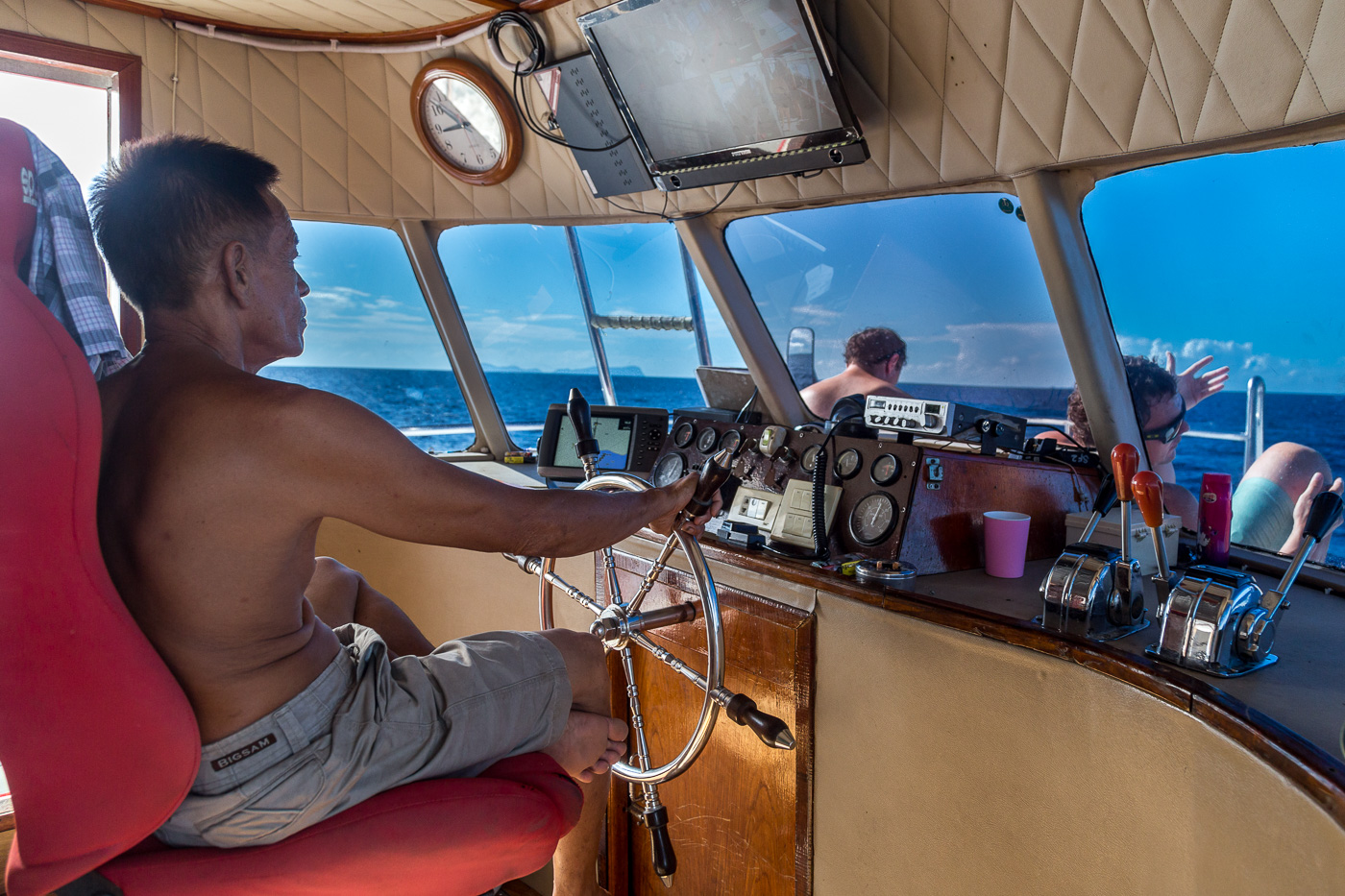 How to Get to Hin Daeng and Hin Muang
How to Get to Hin Daeng and Hin Muang
Hin Daeng & Hin Muang are most easily accessed by day trip from Koh Lanta. The ride takes 2-2.5 hours each way depending on conditions. Scubafish will pick you up from your hotel anywhere on Koh Lanta and shuttle you to Kantiang bay for an early morning departure. We also preferred the south side of Koh Lanta for accommodations, restaurants and beaches.
Another way to visit Hin Daeng & Hin Muang is by a multi-day diving liveaboard departing from Koh Lanta or Phuket.
If You Go: Hin Daeng and Hin Muang Diving Logistics
What: Sister dive sites Hin Daeng & Hin Muang represent the best of what the Andaman Sea has to offer. Located 60-kilometers from the Thailand coastline, these two underwater pinnacles have everything from lush tropical coral gardens to dramatic walls and possible big fish sightings.
Where: Hin Daeng & Hin Muang can be reached by diving day trips (a 2-2.5 hour boat ride) from Koh Lanta. These sites are also often added to a Southern Andaman sea liveaboard lineup.
When: Scubafish schedules weekly dive trips from Koh Lanta to Hin Daeng & Hin Muang on Mondays, Wednesdays and Saturdays between November and April. Divers have the option of diving up to three times over the course of the day. If you are thinking about adding Hin Daeng & Hin Muang to your diving schedule be sure to check with the dive company first to ensure conditions under water are conducive for a dive that day.
How: If you are flying into the Krabi International Airport, catch a 1.5-2 hour mini-bus direct to your Koh Lanta accommodations departing from the airport (approximately 300 Baht per person). If coming from Phuket, public slow boats and expensive private fast boats depart daily for Koh Lanta by way of Koh Phi Phi. We don’t recommend this route unless you are keen to check out Koh Phi Phi on the way. We found it much more costly and time consuming than coming over land.
Disclaimer: Our Hin Daeng and Hin Muang diving adventure was partially sponsored by Scubafish for this trip, but as with everything on our blog, our opinions above are an honest account of what we experienced. As you consider your options for Andaman diving reach out to Keith and the team at Scubafish (+66 75 665 095, contact@scubafish.com, www.scubafish.com) for more information about awesome Koh Lanta dive sites.


